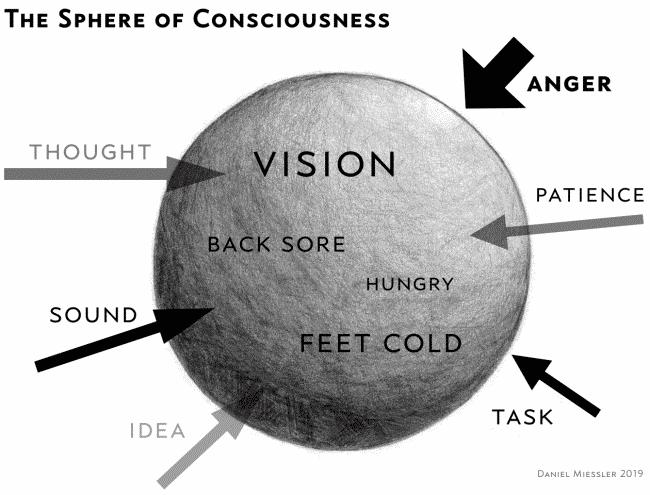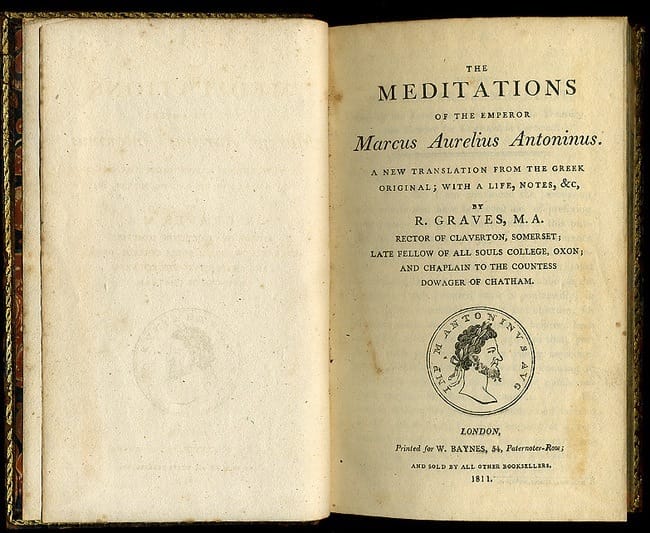A Beginner’s Notes on Meditation
November 16, 2019

I’ve wanted to get into meditation since I was in my late teens, but it just never materialized. Everything I did learn seemed too ephemeral and distant, and I lacked the time to go deep enough to get past that.
I’ve tried multiple meditation apps and Sam’s is my clear favorite.
This has finally changed with the benefits of technology—namely podcasts and meditation apps. I am particularly fond of Sam Harris’ Waking Up app (and book of the same name), and it was his consistent exposure to the practice that finally pushed me through.
I am not an expert in mediation, and in fact I’m not even a decent novice. But I already feel as if I’ve learned enough to capture, so I’ll dedicate this page to what I learn—keeping in mind that I may get it all wrong early on (or perpetually).
Stoicism also teaches us to separate the input from our reaction to it.
I happen to also be studying Stoicism right now, and I find the similarities between its teachings and of Vipassana meditation to be significant and extraordinary. So I’ll be talking about that as well.
The format will be me teaching myself, all the while knowing that I may need to change it as I learn more. I hope my floundering is useful to someone.
1. You are not your inputs, and everything you experience is an input
I think this might end up being the most important and powerful concept in all of meditation. It’s the idea that every single thing streaming into your consciousness is separate from you.
Sights, sounds, pain, pleasure, thoughts, ideas, emotions, desires, etc—and in fact every single thing you can possibly experience—are all inputs into a very specific place called consciousness.
The entire enterprise seems based on this realization.
2. If you are distracted you become your inputs, and if you’re mindful you gain control over them
Modern CBT actually has its roots in Stoicism.
Building on #1, the second thing to realize is that if you don’t see inputs in this way—as seperate from yourself and streaming into consciousness—then yoa are distracted and therefore almost guaranteed to become those various inputs.
This is very similar to what the Stoics talk about (and modern-day therapists as well) when they say there’s a huge difference between what happens to you, and how you choose to react to it.
But this is even more fundamental, and Sam talks in his course about how easy it is to notice this. At any given moment you can just some amount of attention to what you’re thinking or feeling. And upon doing so you instantly and powerfully realize that you had not been doing so before.
If we fail to notice an input, and label it as such, it strikes us from the side and takes control. Only when we face it head-on can we remove its power over us, which we do through awareness.
Where were you when you were not noticing your thoughts and sensations? You weren’t anywhere. You became your inputs, whatever they were. You became anger. You became frustration. You became sadness.
And the godlike power to unbind yourself from those sensations is simply to notice them—tentatively at first, but then later with more skill and practice.
In astronomy if you want to see something dim you have to look away from its center.
If your ankle really hurts, and you don’t view that pain as an input to consciousness, you will become that pain.
If you just gave a really bad presentation, and you don’t view your regret as an incoming and external input to consciousness, you will become that regret.
And if you are lost in thought—not realizing that random thoughts are just additional inputs into consciousness—then you will become those thoughts.
In short, the state of being distracted by life is what allows you to be hijacked by various thoughts, feelings, and emotions.
Get a weekly breakdown of what's happening in security and tech—and why it matters.
And mindfulness is simply flipping the switch from distraction to attention, which lets you see all of life’s stimuli as equal inputs into consciousness, and—most importantly—separate from you.
Observations, Notes, and Questions

Here I’ll be capturing my questions and observations as I learn more about meditation and related topics. If I make any major discoveries—or observations that I think to be a discovery—I’ll update the section above. Everything else will just be captured questions and note-taking.
Nov 16, 2019 — What about focus? Isn’t that a good thing to go into a flow state, or "the zone" when working on something? Programming, for example, is extremely pleasurable when you get into a phase of pure creation. It’s almost like Transcendental Meditation—which is not as good as Vipassana—but is still better than being distracted by multiple things at once. Is this also something to abandon? I don’t think so, but I’m open to ideas.
Nov 16, 2019 — I’m confused about what the self actually is if we accept that the sphere of consciousness is not us. Is that correct? Sam talks about "the illusion of self" so perhaps he’s saying there’s literally no self at all. I wouldn’t mind that for the same reason that I don’t mind that free will is an illusion, but I do need to reconcile the difference between the perceived self, i.e., the practical self, and the self that disappears once you reduce reality to the Sphere of Consciousness. My problem is that I’m always trying to upgrade myself. I’m studying for a reason. I’m reading for a reason. I am trying to improve my own condition so that I can improve the condition of others. Those all require that there is a thing that’s being upgraded—at least conceptually. So I need to explore that and lock it in conceptually in my mind.
Nov 20, 2019 — I updated my learnings above to make the second point about the essential and godlike distinction between distraction and attention. Basically, 99.999% of the world walks around constantly distracted by their thoughts and feelings—whatever they are. It’s the default state, and it’s an absolute prison. Mindfulness is the ability to flip the switch from distraction to attention, which instantly gives you extraordinary power over whatever items happen to be streaming into your consciousness. And that could be an extreme pain in your leg or the horrible feeling of losing a great job. Distraction vs. Attention—that’s the essence of it. I think, anyway.
Nov 20, 2019 — Digging deeper into the self question above, I think I prefer to merge the worlds of neurobiology, evolutionary biology, and philosophy. So basically, if we know that free will doesn’t exist, and that we’re basically mechs for genes doing their best to reproduce, then exactly what are we getting at with meditation? What does it mean to unbind ourselves from our inputs by focusing our attention? Is the self the observer of consciousness? And how is that not also consciousness? Where is the self? In my mind this is a very specific illusion produced by biology because it’s useful. But I would like to square that with philosophy in a way that is as non-dissonant as possible. See my writing on Camus and Free Will if you want to see where I’m coming from there.
Nov 20, 2019 — I heard a great quote in episode 15 of Sam’s Waking Up course today:
If there’s only one space for consciousness, then what can possibly be distracted from what?
Sam Harris, Waking Up Course Lesson 15
Sam Harris, Waking Up Course Lesson 15This tells me that the answer to my questions above is actually that there is no self, which is something Sam and many others have been saying for decades, centuries, and millennia. Basically, there is only consciousness. There’s no observer looking at it, there is simply it by itself. That’s a bit heavy for me to grasp at the moment, for the reasons outlined in the entries above. I need to find a way to reconcile that with biology and evolution.